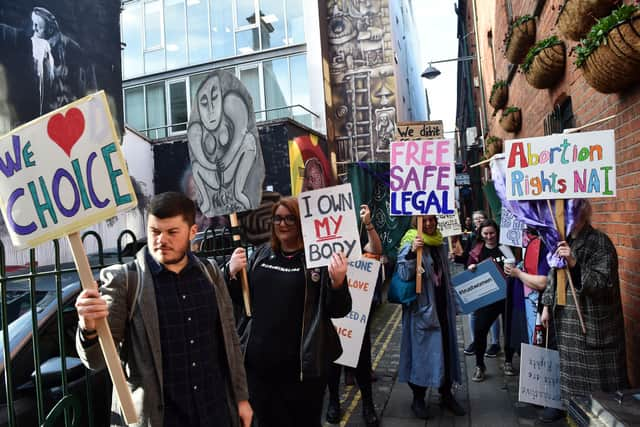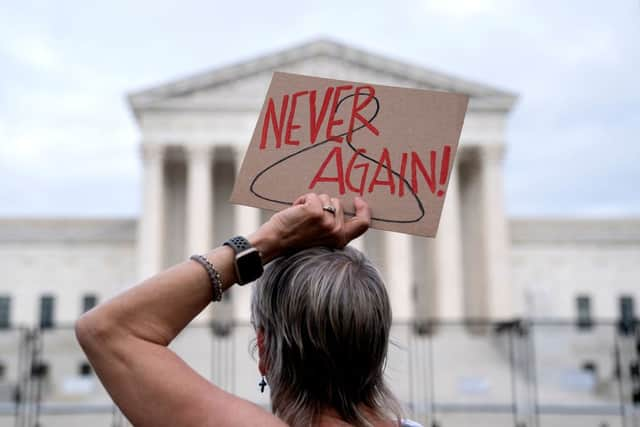When was abortion legalised in UK? Laws explained as woman jailed for illegal abortion during 2020 lockdown
and live on Freeview channel 276
Abortion has become an important topic of conversation recently after a 44-year-old English woman was given a 28-month extended sentence after she admitted illegally procuring her own abortion when she was between 32 and 34 weeks pregnant. Senior MPs have said that Parliament must consider overhauling the “out-of-date” law used to jail the mother-of-three.
The Crown Prosecution Service described the case as “complex and traumatic”, but said it has a duty to ensure laws are “properly considered and applied when making difficult charging decisions”. The woman in question will serve 14 months in custody, and the remainder on licence after her release.
Advertisement
Hide AdAdvertisement
Hide AdSentencing judge Mr Justice Pepperall said: “This case concerns one woman’s tragic and unlawful decision to obtain a very late abortion. The balance struck by the law between a woman’s reproductive rights and the rights of her unborn foetus is an emotive and often controversial issue. That is, however, a matter for Parliament and not for the courts.”
These are the laws in England, Scotland, Wales and Northern Ireland regarding abortion.
What are abortion laws in the UK?
The Abortion Act 1967 covers Scotland, England and Wales, but not Northern Ireland.
The act states that an abortion can be carried out during the first 24 weeks of pregnancy, as long as two doctors agree that the termination would cause less risk to the woman’s physical or mental health (or that of her children) than continuing the pregnancy.
Advertisement
Hide AdAdvertisement
Hide AdThe law also says that an abortion may also be carried out later in a pregnancy if:
- It’s necessary to save the woman’s life
- It’s to prevent grave permanent injury to the physical or mental health of the pregnant woman
- There’s a substantial risk of the child being born with serious disabilities
By law, two doctors must verify that the requirements of the Abortion Act have been met, and health services must act women why they want an abortion.
What are abortion laws in Northern Ireland?
In Northern Ireland, abortion was decriminalised and subsequently made legal in October 2019, with a new framework for lawful abortion services brought into effect at the end of March 2020.
Terminations are allowed unconditionally up to 12 weeks and are allowed up to 24 weeks in cases where continuing the pregnancy would risk mental or physical injury to the woman or girl that is greater than the risk of aborting the pregnancy.
Advertisement
Hide AdAdvertisement
Hide AdThere is no time limit for an abortion in situations where there is substantial impairment to the fetus, including where death is likely to occur before, during or shortly after birth.


The 24 week limit is lifted in cases where there is risk of death or serious permanent injury to the woman or girl that is greater than the risk of termination, or when necessary in order to prevent serious physical or mental harm, including immediate necessity such as during birth.
Only medical professionals are able to perform abortions, such as registered doctors, nurses and midwives.
A termination can be conducted at a GP surgery, a Health and Social Care premises or at home using abortion pills - these can only be used for the second stage of early termination.
Advertisement
Hide AdAdvertisement
Hide AdDespite abortion being legalised in 2019, abortion services in Northern Ireland remain limited.
Additionally, under the Offences Against the Person Act 1861, abortion remains a criminal offence should a woman end her own pregnancy without the approval of two doctors.
How is an abortion carried out?
There are two options for how an abortion is handled:


- A medical abortion, known as the “abortion pill”, where you take two medicines, usually 24 hours apart, to induce an abortion
- Surgical abortion, where you have a procedure to remove the pregnancy
The NHS says that, after a person has had an abortion, they would need to take things easy for a few days.
“It’s likely you’ll have some discomfort and vaginal bleeding for up to 2 weeks,” the NHS says.
Comment Guidelines
National World encourages reader discussion on our stories. User feedback, insights and back-and-forth exchanges add a rich layer of context to reporting. Please review our Community Guidelines before commenting.
